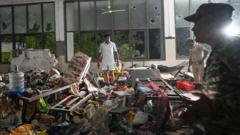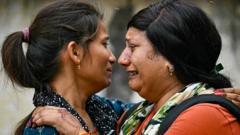As the trial of retired surgeon Joel Le Scouarnec concludes, victims are left grappling with a lack of public discourse. With 299 admitted assaults on minors, the trial has exposed institutional weaknesses but garnered little media attention compared to other abuse cases.
Disquiet Surrounds Landmark Child Abuse Trial as Survivors Seek Recognition in France

Disquiet Surrounds Landmark Child Abuse Trial as Survivors Seek Recognition in France
The trial of Joel Le Scouarnec, France’s most notorious paedophile, is marked by frustration from victims highlighting society's indifference to child abuse.
The trial of Joel Le Scouarnec, a retired surgeon accused of sexually abusing nearly 300 children, has concluded in Vannes, France, leaving victims feeling a deep sense of frustration over societal indifference. The trial was set in a carefully prepared venue to draw significant attention, echoing the massive media coverage of the Pelicot mass rape case. However, it has resulted in a disappointing response from the public and media, casting doubt on why such a big case is being overlooked.
One victim, Manon Lemoine, expressed her exhaustion and anger over society's tepid reaction to their suffering, fearing that the lack of interest might lead to a cycle of silence where such abuses could continue unchecked. Many of the victims, including Lemoine, have voiced their discontent over the absence of a parliamentary commission that might officially address the systemic failures highlighted by the trial.
Worse still, with their voices often feeling silenced, the victims formed a campaign group. They lament the feeling of invisibility, suggesting that the sheer number of victims may have led authorities to disregard their plight. Some survivors have even chosen to reveal their identities publicly, hoping to press for societal awareness and acknowledgment of the horrors they have faced.
Critiques have been directed at society's broader reluctance to confront child sexual abuse. Some like lawyer Myriam Guedj-Benayoun criticized France's "systemic, organised silence" regarding such cases. The courtroom has heard disturbing accounts of Le Scouarnec's detailed documentation of his offenses, leading many observers to reflect on how the medical establishment ignored warnings from authorities like the FBI.
As journalists have begun to pay closer attention toward the trial's conclusion, some hope that these revelations may spur a change in attitudes towards addressing child abuse. While the Le Scouarnec case exposes pressing issues within the healthcare system, it raises vital questions about France's readiness to confront the grim reality of child sexual abuse head-on.
Despite mixed feelings about the trial’s impact, Lemoine and several activists maintain hope that shedding light on their suffering can lead to transformative changes in the societal treatment of abuse survivors, as they eagerly anticipate what might emerge from this unsettling chapter in France's judicial history.



















